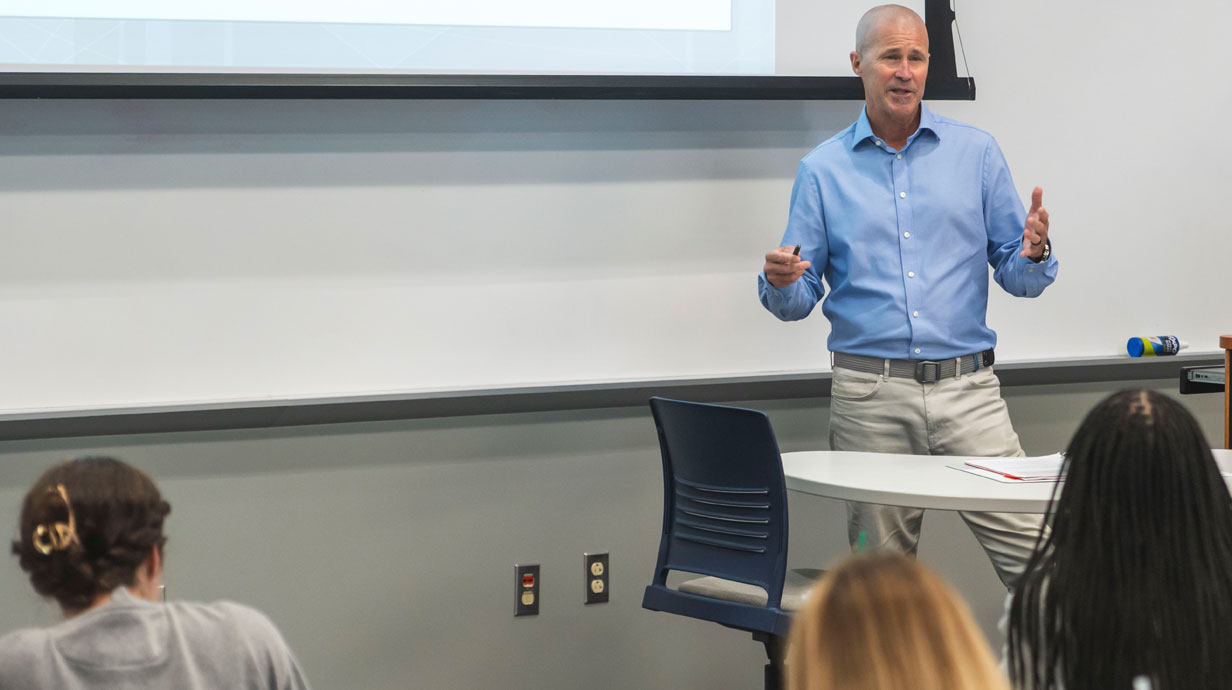Ole Miss Research on Aging Earns Gold Honor
Award recognizes professor's work on easing loneliness with group engagement

OXFORD, Miss. – A University of Mississippi researcher's study of how livestreamed nature videos can help older people feel less isolated shows promise to help them stay alert and active. The work has also drawn attention from a nonprofit institute focused on healthy aging.
Keith Anderson, chair of the UM Department of Social Work, has studied how using "virtual care farms" can enhance social connections and well-being among older adults in assisted living.
“The project stems from some work that we've done on green care farms, which are actual farms and ranches where older adults and some other groups go during the day to participate in farm life and ranch life," he said. "It's an alternative to institutional care, like adult day services.”
From that research, a woman who runs a Montana ranch equipped with cameras contacted Anderson and his team. Subscribers can access livestreams and archived footage from the ranch.
“They all come together as a group and chat about what they’re seeing on the livestreams," Anderson said. "From that work on the virtual care farm, we decided to create an intervention in assisted living for older adults to access these nature-focused livestreams.”
Older adults watch from a central activity area on a TV while an interpreter guides them through what they’re seeing, he said. Many participants have cognitive limitations, so the interpreter explains what is happening, fosters communication and sharing, poses questions to the group, and solicits answers related to the nature-focused live streams.
The project was a hit.
“It also enhanced well-being," Anderson said. "General well-being for these folks, in addition to isolation and boredom in these facilities is another significant problem.
“It was moving beyond bingo or some other rather mundane activity, and it was a meaningful activity that they looked forward to and cared about.”
The results are significant because 25% of Americans over 65 are considered socially isolated and 43% of Americans over 65 report feeling lonely, according to the USC Center for Elder Justice.
The Mather Institute gave Anderson its Gold Award in the 2025 Innovative Research on Aging Awards.
“It's recognition that what we're doing is creative and innovative and has a potential positive effect on older adults,” he said. “What we hope going forward is that it gives more exposure to what we're doing, which I think would foster greater collaboration with other researchers in the same area.
"We're also open to the idea of other people taking the idea and moving it into another direction.”
Anderson said an anticipated finding, and one that he felt positive about, was that the work can help foster social connections between the older adults and between the older adults and the interventionists.
“This work addresses real challenges facing older adults while offering scalable, evidence-based solutions that can be implemented immediately in care settings,” said Daniel R. Czech, dean and professor in the Ole Miss School of Applied Sciences. “Dr. Anderson's achievement reflects the caliber of scholarship we've cultivated in applied sciences.”
Anderson said he believes society underestimates the capabilities of older adults.
“When someone moves to a facility like assisted living or a nursing home, we tend to think they have less capability to engage, to enjoy their lives, to enjoy moments of their lives," he said. "I think providing these opportunities for engagement, enjoyment and fulfillment is really important for older adults, particularly those with some limitations that may reduce their opportunities to engage with society and with nature.”
Nature, similar to music, is a common meeting ground for most people, he said. One example of this is when Anderson showed a livestream of Osprey catching fish to a group at the assisted living community.
“One of the really interesting things was the osprey would catch fish on the livestream, which is what they do, but almost every single person in the group had a fishing story," Anderson said. "It was another common ground of learning how to fish or going fishing with my mom or dad, grandmother or grandfather or children.
"It really is a common place that we all meet up, and there are certain healing powers to nature as well.”
TOP: Keith Anderson, chair of the UM Department of Social Work, teaches an undergraduate class on Social Work Research at the University of Mississippi
By
Jordan Karnbach
Campus
Published
September 25, 2025
